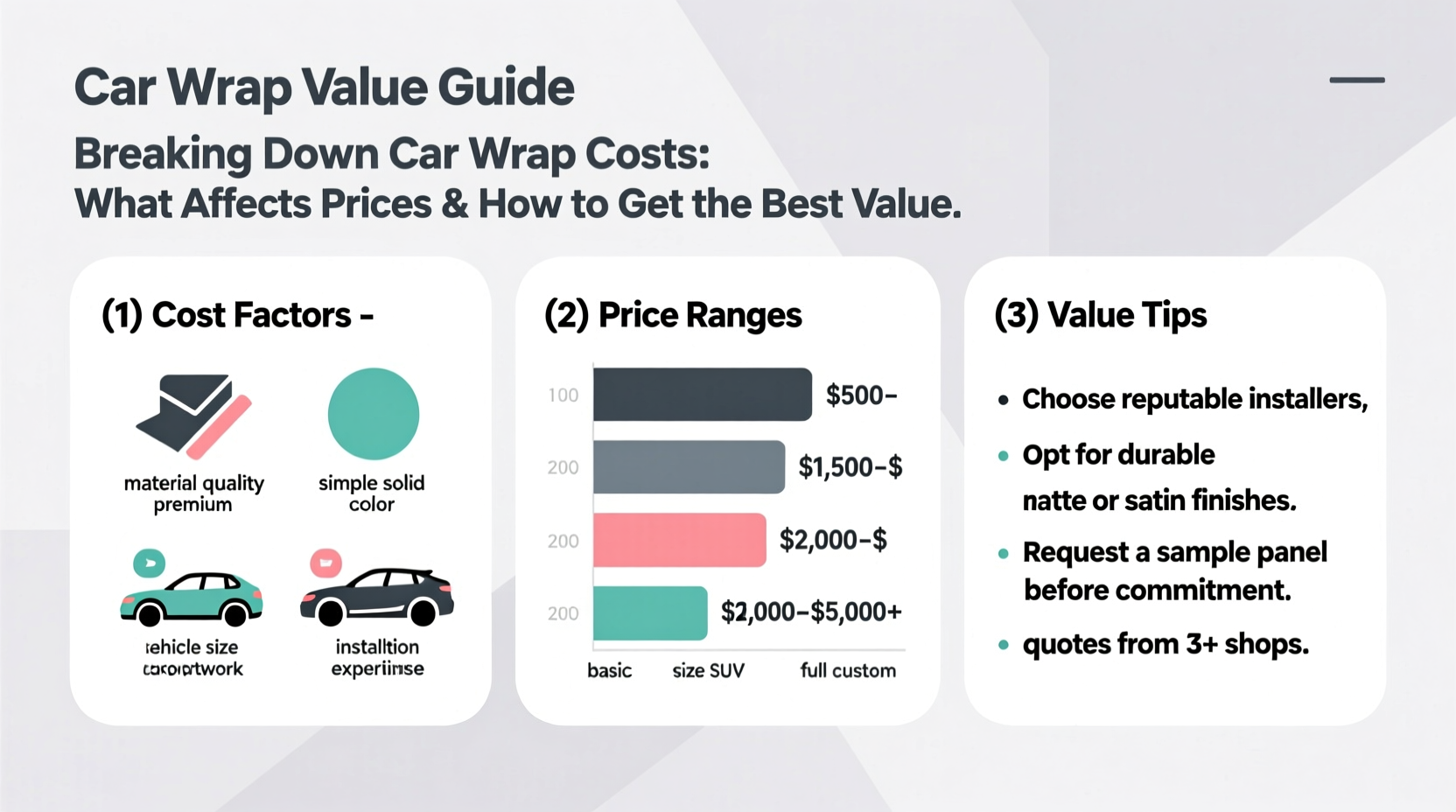Vehicle wraps have become a popular alternative to traditional paint jobs, offering customization, protection, and cost-effective branding. Whether you're wrapping your personal car in a bold new color or turning your fleet into mobile advertisements, understanding the true cost of a car wrap is essential. Prices can vary widely—anywhere from $500 to over $5,000—and knowing what drives those numbers helps you make smarter decisions. This guide breaks down every factor that influences pricing and shows you how to maximize value without sacrificing quality.
What Determines Car Wrap Pricing?

The total cost of a car wrap isn’t arbitrary. It’s shaped by several interrelated factors, including vehicle size, material type, design complexity, and installer expertise. A basic partial wrap on a compact sedan will naturally cost less than a full-color change wrap on an SUV with custom graphics. But beyond surface-level differences, there are deeper variables at play.
- Vehicle size and complexity: Larger vehicles require more vinyl and labor. Coupes and sedans typically cost less than trucks, SUVs, or vans.
- Type of vinyl: Matte, gloss, satin, chrome, carbon fiber, or textured finishes each carry different price points. Specialty materials like chameleon or reflective vinyl can double the base cost.
- Wrap coverage: Partial wraps (hood, roof, or side decals) are significantly cheaper than full wraps that cover every panel.
- Design and printing: Custom artwork, photography-based wraps, or branded designs with precise color matching add to the cost due to design time and large-format printing.
- Labor and experience: Skilled installers charge more, but their work lasts longer and avoids issues like bubbling or poor adhesion.
Material Choices and Their Impact on Cost
The vinyl used in car wraps is not one-size-fits-all. The market offers multiple grades and types, each suited for different purposes. Understanding these options ensures you don’t overpay for unnecessary features—or underinvest in low-quality materials that peel within months.
| Vinyl Type | Average Cost per Square Foot | Best For | Lifespan |
|---|---|---|---|
| Gloss | $3–$5 | Standard color changes, high shine | 5–7 years |
| Matte | $4–$6 | Modern, stealthy look | 4–6 years |
| Satin | $5–$7 | Luxury finish, subtle sheen | 5–7 years |
| Chrome | $8–$12 | Show cars, dramatic effect | 3–5 years |
| Color-Shift (Chameleon) | $10–$15 | Custom builds, eye-catching effects | 4–6 years |
Premium brands like 3M, Avery Dennison, and Oracal dominate the professional market because they offer superior conformability, durability, and warranty support. While generic vinyl may seem like a bargain upfront, it often lacks UV resistance and adhesive strength, leading to premature failure.
“The material is only as good as its installer. Even top-tier vinyl can fail if applied improperly.” — Carlos Mendez, Certified Wrap Installer & Trainer
Step-by-Step Guide to Getting the Best Value
Maximizing value doesn’t mean choosing the cheapest option—it means getting the highest return on your investment through smart planning and informed choices. Follow this timeline to ensure you’re making a cost-effective decision.
- Define your goal: Are you protecting paint, changing color, or promoting a business? Your purpose shapes material and design needs.
- Research installers: Look for shops with portfolios, verified reviews, and certifications from major vinyl manufacturers.
- Request detailed quotes: Compare at least three quotes that include material brand, labor hours, and warranty terms.
- Choose the right material: Match the vinyl type to your climate and usage. For example, matte finishes show scratches more easily and require careful washing.
- Plan for maintenance: Budget for cleaning supplies and occasional touch-ups to extend the wrap’s life.
- Schedule installation: Avoid peak seasons (summer) when shops are busiest and wait times may affect pricing.
Real Example: Wrapping a Small Business Fleet
Jessica runs a mobile detailing service with two Honda Civics. She wanted to turn her cars into rolling ads but was quoted between $1,800 and $3,200 per vehicle. After evaluating options, she opted for a partial wrap focusing on the doors and rear panels, using Avery Supreme Wrapping Film in gloss black with white lettering.
By simplifying the design and avoiding complex curves, her installer completed both cars in two days for $2,400 total. She included her logo, phone number, and website—clear, readable, and professional. Two years later, the wraps remain intact with only minor edge wear, and she estimates a 30% increase in customer calls attributed to vehicle visibility.
Her strategy saved over $1,000 compared to full wraps while still achieving strong branding impact. This case illustrates how strategic scope reduction can deliver excellent ROI without compromising core goals.
Common Mistakes That Inflate Costs
Many people unknowingly drive up their wrap expenses through avoidable errors. Recognizing these pitfalls helps you stay within budget and achieve better results.
- Choosing the cheapest installer: Inexperienced applicators may cause irreversible damage or use subpar materials, leading to rewraps.
- Skipping surface prep: Paint defects, wax residue, or rust must be addressed before wrapping. Skipping this step risks adhesion failure.
- Overcomplicating the design: Intricate patterns or gradients increase printing and alignment time, raising labor costs.
- Ignoring warranty terms: Some warranties are voided by improper care or non-certified installers. Always read the fine print.
FAQ
How much does a full car wrap usually cost?
A full wrap on a standard sedan typically ranges from $2,500 to $4,000, depending on material and design. Trucks and SUVs may cost $3,500–$5,500 due to increased surface area.
Can I wrap a leased car?
Yes, wraps are removable and often encouraged by leasing companies as they protect the original paint. Just ensure the wrap is professionally removed at the end of the lease to avoid penalties.
Do wraps damage the original paint?
No—when installed and removed correctly, wraps protect the underlying paint from UV rays, scratches, and minor dings. However, existing paint flaws (like peeling or rust) can worsen if not prepped properly.
Checklist: How to Choose a High-Value Wrap Service
- ✅ Verify the shop uses reputable vinyl brands (3M, Avery, Oracal)
- ✅ Review before-and-after photos of past installations
- ✅ Confirm the installer offers a warranty (typically 1–3 years)
- ✅ Ensure the quote includes surface preparation and final inspection
- ✅ Ask about aftercare instructions and recommended cleaning products
- ✅ Check online reviews on Google, Yelp, or industry forums
Final Thoughts: Invest Smart, Not Just Cheap
A car wrap is more than a cosmetic upgrade—it’s a long-term investment in protection, branding, or personal expression. While initial costs may seem steep, a well-executed wrap can last five years or more with minimal upkeep, outperforming frequent paint corrections or repainting.
The key to value lies in balance: selecting durable materials, partnering with skilled professionals, and aligning the project scope with your actual needs. Avoid the temptation to cut corners on labor or vinyl quality; the savings today could cost you double tomorrow.









 浙公网安备
33010002000092号
浙公网安备
33010002000092号 浙B2-20120091-4
浙B2-20120091-4
Comments
No comments yet. Why don't you start the discussion?